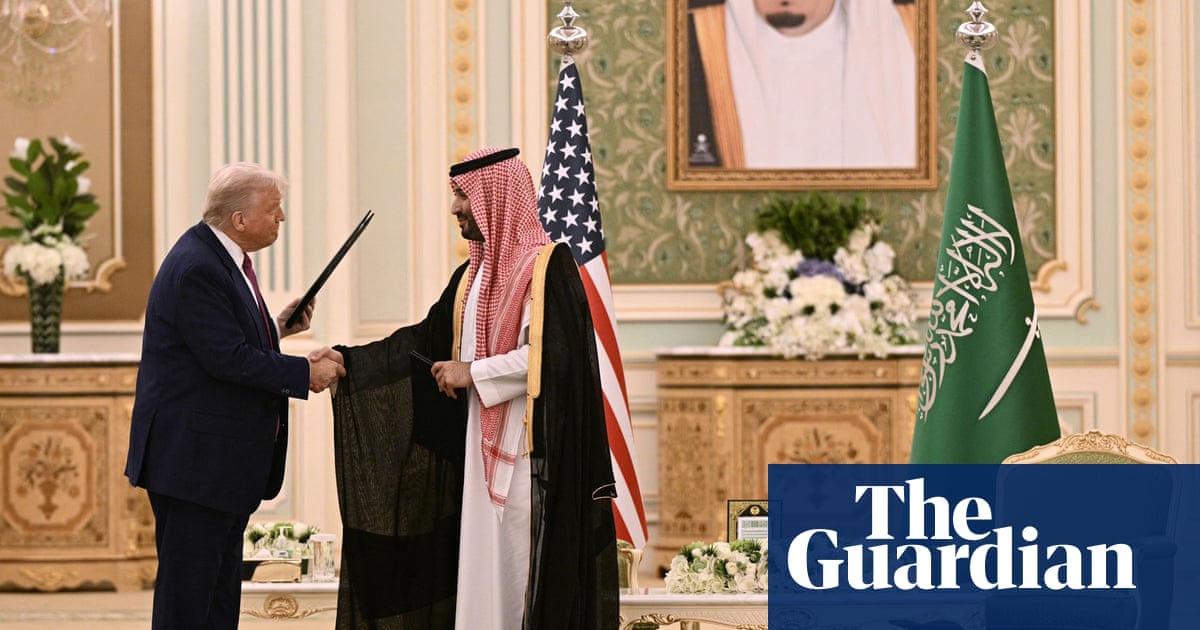U.S.-Saudi Arms Deal: A Landmark Agreement
In a landmark moment for U.S. foreign policy, the United States and Saudi Arabia have signed a jaw-dropping $142 billion arms deal, heralded by the White House as the "largest defense sales agreement in history." This monumental agreement marks the first leg of former President Donald Trump’s four-day diplomatic tour through Gulf states, a trip heavily centered on aligning economic interests and showcasing the advantages of his transactional approach to foreign relations.
The Aims of Trump’s Tour
During this diplomatic excursion, not only was the arms deal a focal point, but Trump also looked to solidify relationships with key figures in the region. He has confirmed plans to meet Syria’s new leader, Ahmed al-Sharaa—a pivotal figure whose forces helped oust Bashar al-Assad back in 2024. This meeting will be notable as it represents the first direct interaction between a sitting U.S. president and a Syrian leader since Bill Clinton’s encounter with Hafez al-Assad in 2000.
Lifting Sanctions on Syria
At an investment forum, Trump articulated an ambitious plan: he intends to lift sanctions on Syria, contingent on discussions with Saudi Crown Prince Mohammed bin Salman and Turkey’s Recep Tayyip Erdoğan. "I will be ordering the cessation of sanctions against Syria in order to give them a chance at greatness," Trump declared, indicating a possible thaw in U.S.-Syria relations as he aims to foster economic opportunities.
Wooing the West
Sharaa’s overtures toward Trump are not just diplomatic but also financial. His pitch includes enticing U.S. investment into Syrian oil, reconstruction efforts, and even the prospect of a Trump Tower in Damascus—all dependent on the lifting of U.S. sanctions. The excitement among Sharaa’s team was palpable, capturing the moment with Radwan Ziadeh, a close advisor to the Syrian president, who remarked, “This is amazing, it worked,” following the mockup of Trump Tower shared during their conversations.
Massive Investment Commitments
Back in Saudi Arabia, the focus shifted toward investment. During a lavish lunch with Crown Prince Mohammed bin Salman, Trump was promised a staggering $600 billion investment in the U.S. economy. This included plans for artificial intelligence data centers, substantial purchases of energy equipment, and even jets worth billions, although specifics were notably vague.
The Arms Deal: A Defense Game-Changer
The arms deal with Saudi Arabia encapsulates a broader strategy for U.S. defense exports. Touted as the "largest defense sales agreement in history," it involves a consortium of U.S. defense manufacturers, aiming to bolster Saudi air power, improve missile defense capabilities, and enhance border security. The deal signifies not just an economic relationship but also a deepening of strategic military ties.
A Presidential Welcome
Trump’s arrival in Riyadh was characterized by a warm and royal welcome, complete with an escort of Saudi F-15s. As he sat with Crown Prince Salman in the opulent halls of the Royal Court, a mélange of business leaders, including tech magnates like Elon Musk and AI innovators like Sam Altman, framed the discussion. The atmosphere was charged with optimism as Trump exuded confidence in the burgeoning relationship, even joking that the promised Saudi investments should reach $1 trillion.
Like a Business Venture
Critics, however, have raised alarms about the implications of Trump’s approach toward foreign policy, seeing this as tantamount to a shift toward the commodification of U.S. diplomacy. They express concern that such dealings favor Trump’s personal business interests, especially given his family’s financial ties to key players in the Gulf region. Notable is the controversy surrounding a luxury gift—a Boeing 747-8 from Qatar, proposed for conversion into a presidential plane—further blurring the lines between government dealings and personal gain.
Reactions and Controversy
Past meetings with Saudi leaders have often been marred by controversy, particularly regarding the 2018 murder of journalist Jamal Khashoggi. However, Trump’s interactions showed a distinct departure, marked by camaraderie and optimistic dialogue. Despite this, he acknowledged that goals like Saudi diplomatic recognition of Israel would require patience, especially in light of escalating tensions due to the ongoing war in Gaza.
A Focus on Israel and Beyond
While his agenda includes building bridges with various nations in the Middle East, Trump’s decision to forgo a visit to Israel during this trip is telling. The decision is likely influenced by both the ongoing conflict and his fraught relationship with Israeli Prime Minister Benjamin Netanyahu, who has recently reaffirmed aggressive military actions against Hamas.
The Geopolitical Landscape
Sharaa’s diplomatic overtures reflect a desire for normalization with the U.S., positioning Syria more favorably in the geopolitical landscape. He has sweetened the deal with a range of incentives, including economic advantages and assurances regarding Israel’s security, indicating a commitment to shifting relationships in the region.
The Unfolding Drama
Overall, Trump’s tour through the Gulf states is emblematic of a broader reorientation of U.S. foreign policy, one that prioritizes direct negotiations and immediate returns—whether they be financial or political. As he navigates this complex terrain, the entwining of economics and diplomacy raises pressing questions about the future of American foreign relations and the potential repercussions on both regional stability and U.S. standing globally.


